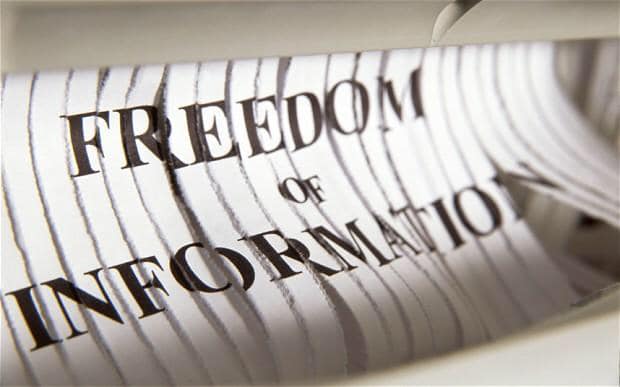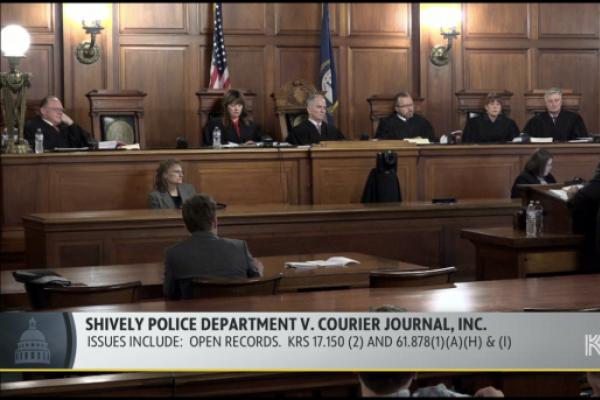
Trump v Freedom of Information: An epilogue from Columbia Journalism Review:
ANALYSIS
What the Trump administration meant for freedom of information requests
By Philip Eil
FEBRUARY 15, 2021
THE ELECTION OF DONALD TRUMP PROMISED AN EPIC TEST for the Freedom of Information Act. On one side, the powerful, yet deeply flawed, transparency law that turned 50 years old a few months before Trump's 2016 election. On the other, a brash, dishonest, norm-flouting billionaire who had spent his adult life working in a privately-owned business. What would happen when Trump, the reality-star-turned-demagogue, became subject to the presidency's transparency laws?
Alas, the FOIA world is notoriously slow-moving; historian and journalist Jon Wiener's battle for John Lennon's FBI file began with a request in 1981 and didn't fully end until late 2006, when the bureau handed over the last 10 pages. And one of the biggest FOIA-driven stories of the Trump years, the Washington Post's "Afghanistan Papers," was a reminder that the law often works better as a window into the past than a mirror of the present.
But we can begin to glean at least the outlines of what happened when Donald Trump met the law that the late New York Times columnist William Safire said "has done more to inhibit the abuse of Government power⦠than any legislation in our lifetime." The results of that clash are as revealing about the 45th president as they are about FOIA.
—
Trump came into office with the FOIA bar already low. The Obama administration, despite lofty campaign rhetoric about transparency and a first-day-in-office memo urging agencies to "adopt a presumption in favor of disclosure," set records for FOIA non-compliance and was caught at one point—by a FOIA lawsuit, naturally—contradicting its public posture by lobbying against FOIA reform behind closed doors. Thus, as MuckRock co-founder Michael Morisy put it, comparing Obama and Trump's transparency records is a case study in "setting high expectations and then failing to meet them in some really critical ways versus setting some really low expectations and delivering what folks expected."
Trump as president lied prodigiously, withheld White House visitor logs, went months between formal press briefings, made employees sign non-disclosure agreements, attempted to stop the publication of books about his administration, and committed a long list of other offenses against openness.
And when it comes to FOIA, it's hard to find any statistical category where the Trump administration cleared even the low bar set by Obama. FOIA rejections and redactions increased under Trump, while delays grew at most federal agencies and the number of FOIA lawsuits skyrocketed. "Just about by any measure, things have gone from bad to worse," says Adam Marshall, who works on FOIA lawsuits for the Reporters Committee for Freedom of the Press.
Jason Leopold, a senior investigative reporter at BuzzFeed who used the law to pry loose more than 40,000 pages of documents during the Trump years, says that in his everyday requesting and conversations with FOIA analysts, he noticed a culture during Trump's tenure of "more of an active conversation taking place within the agencies to withhold records [and] to thwart the efforts of requesters to essentially ensure that information is not being released."
Though some of this took place behind the scenes, there were plenty of moments when that disdain for FOIA was publicly visible. At one point, the Department of Interior proposed new rules that would make it more difficult for members of the public to file requests, before retracting the changes due to public outcry. While serving as the secretary of the Department of Homeland Security, John Kelly encouraged an official to avoid sending emails in order to evade FOIA. (Similar allegations about email shenanigans were later raised about Trump's Centers for Disease Control and Prevention.) Last March, a high-level Department of Justice official made the absurd charge that FOIA lawsuits had become a way for plaintiffs to generate attorney's fees (which would surely make them one of the least effective get-rich-quick schemes in American history). And later in the year, former Attorney General Bill Barr publicly griped, "There is no FOIA for Congress or the Courtsâ¦Yet Congress has happily created a regime that allows the public to seek whatever documents it wants from the Executive Branch."
COVID-19 slowed the gears of the federal FOIA-response machinery further. National Security Archive Director Tom Blanton says that the results of the pandemic were simple and dramatic: it "shut down most agencies' FOIA processes altogether."
BuzzFeed's Leopold says the law's administration is so flawed that "to say it's in disarray would not actually be a proper way of explaining it." Washington Post FOIA director Nate Jones adds, "FOIA, today, [in December 2020], isâ¦significantly worse off than it was four years ago."
Adam Marshall says that the national FOIA ecosystem is in such "abysmal" shape that when he conducts records-request training for journalists around the country, he shares a message at the beginning of each session: avoid it if you can. "If you can get documents in some other way, either through a state or local public record request or through some other means, that is almost assuredly going to be faster than trying to get them through a federal FOIA request," he says.
—
And yet despite the law's age, its flaws, and an administration that was openly hostile to its ethos, FOIA still produced remarkable results during Trump's presidency. Indeed, one of the enduring lessons of the last four years is that, while FOIA may be badly broken, it's far from useless or obsolete, particularly if you've got lawyers.
The Trump years saw FOIA put to powerful use as a fact-checking tool. When White House Press Secretary Sean Spicer exaggerated the crowd size at the previous day's inauguration, requesters used FOIA to obtain surveillance video and aerial photos to disprove him. When Donald Trump tweeted accusations that the Obama administration had wiretapped Trump Tower, it was a FOIA lawsuit that compelled the Federal Bureau of Investigation and the Justice Department's National Security Division to state, for the record, that it had no evidence to support such claims. More recently, the Washington Post used FOIA to access a State Department cable showing that the White House had no hard proof to back up its claims that COVID-19 had been deliberately or accidentally released by a Chinese laboratory.
FOIA also took us behind the scenes at executive agencies as employees reacted to an unpredictable, sometimes unhinged, president. FOIA-produced emails revealed anger and indignation from NOAA scientists over "SharpieGate," when someone in the White House used a marker to hand-draw an extension of Hurricane Dorian's expected path in order to match Trump's comments. The law also helped reveal "chaos" at the Pentagon following the president's tweets about banning transgender soldiers, and "shock" and "sadness" at the FBI following Trump's dismissal of agency director, James Comey.
Meanwhile, FOIA helped us to more clearly see some most important moments and policies of the presidency. The best example of this—and surely one of the signature FOIA stories of the Trump Years—was BuzzFeed's multi-part series on the Mueller Report, which unredacted key portions of the report, added hundreds pages of newly released background material, and, at one point, prompted a federal judge to lambast Bill Barr for the way his pre-release memo misleadingly spun the report in Trump's favor. BuzzFeed also used the law to produce information on deaths in Immigrations and Customs Enforcement custody during the Trump years.
Elsewhere, FOIA helped deepen our understanding of the pandemic. In July, a New York Times FOIA lawsuit prompted the CDC to release data showing that "Latino and African-American residents of the United States have been three times as likely to become infected as their white neighbors." Thanks to another FOIA lawsuit, we learned that NFL star Tom Brady's company, TB12, received nearly a million dollars in aid under the Paycheck Protection Program, and that, overall, according to one expert quoted in the Washington Post, "this program primarily benefited the well-banked and well-lawyered at the expense of the small businesses it was supposed to benefit." FOIA also helped produce one of the most remarkable documents of the Trump era: a draft press release from the United States Postal Service announcing plans to send five cotton masks to every household in the country—a total of 650 million masks—during the early days of the COVID-19 crisis. That policy never came to fruition and the release was never published, but thanks to FOIA, we have a glimpse of alternate history in which, perhaps, fewer Americans could have died.
Overall, the law was perhaps most effective in highlighting the various ways Trump worked the presidency to his financial advantage. Trump arrived in office with a dizzying tangle of conflicts of interest, and over the four years of his presidency, FOIA revealed the way he funnelled hundreds of thousands of taxpayer dollars through the Department of Defense, Department of Homeland Security, Department of State, Department of Commerce, and other agencies to properties he owned. According to one FOIA-based Washington Post report, Trump's golf club in Bedminster New Jersey "charged the Secret Service more than $21,800 to rent a cottage and other rooms while the club was closed and otherwise off-limits to guests." In another case, FOIA helped ProPublica publish a taxpayer-funded $1,000 liquor bill for Trump staffers at Mar-A-Lago.
This exposure of questionable uses of taxpayer money extended to other high profile figures in Trump's orbit, as well. FOIA gave us emails showing that Department of Housing and Urban Development (HUD) Director Ben Carson and his wife, Candy, spent $31,000 on furniture for a dining room at HUD headquarters. The Intercept used the law to shine a light on millions spent on security by Environmental Protection Agency Director Scott Pruitt, including $80,000 for radios and $1,500 for "tactical pants." The organization Citizens for Responsibility and Ethics in Washington (CREW) used the law to report on Secretary of State Mike Pompeo's use of tens of thousands of taxpayer dollars to fund lavish dinners for GOP donors and other high-profile conservatives. CREW also used FOIA to highlight tens of thousands of dollars spent on Secret Service protection for a Donald Trump Jr. hunting trip to Mongolia.
—
Since its passage in 1966, the FOIA has led to embarrassing or alarming revelations about nearly every American president, including FBI surveillance of groups opposed to Ronald Reagan's policies, the details of state-sanctioned torture under George W. Bush and the legal justification for drone killings under Barack Obama.
As of today, it's too early to say how Joe Biden will approach and administer the FOIA. The law went unmentioned in the barrage of memos and executive orders he has issued in his first days on the job, an absence that was itself revealing about transparency's ranking on his list of priorities. And, a few weeks before inauguration, his transition team declined to answer questions from independent reporter Joshua Eaton, for an excellent New Republic piece exploring Biden's potential approach to transparency. For the moment, it remains to be seen if the new administration will adopt any of the open-government recommendations offered by the good-government advocacy group, Accountability 2021.
Adam Marshall describes the various challenges of the last four years—including COVID-19, government shutdowns and political meddling in FOIA matters—as an unprecedented stress test for the law. The result?
"FOIA is still standing and still turned to every single day by reporters trying to get information for the benefit of the public," he says.
This doesn't change the profound and numerous ways in which the law fails requesters, but it's important to place the failures and successes side by side. "You can't look at one aspect of FOIA over the last four years without the other," he says. "It's both broken and more necessary than ever."
Correction: An earlier version of this story incorrectly named the former secretary of the Department of Homeland Security as Michael Kelly. He is John Kelly.



